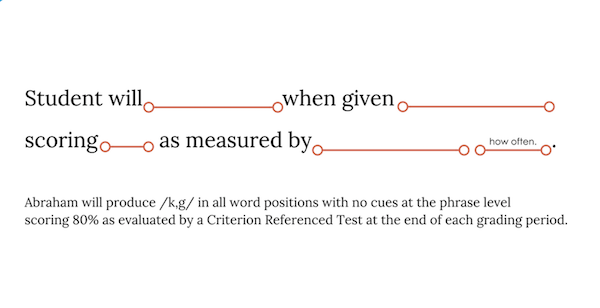
IEP Goals and Objectives for the Speech Therapist
June 17, 2019
Ugh - goal writing! This is something I have always struggled with, even as an experienced clinician. Writing a specific, measurable goal does not come naturally to me. I knew what I wanted to target and I knew how I would measure progress, but formulating this into a clear goal that anyone would read and interpret in the same way was not my strength. I never felt like goal writing was taught very clearly in any of my courses, yet it’s something that is critically important to writing a quality treatment plan.
When we developed the goal bank in SLP Toolkit, we knew we wanted more than just a list of pre-written goals. Goals need to be individualized to a student’s needs and selecting generic goals may not accomplish this. We decided it would be more beneficial to create a resource that allowed you to develop your own goals using a simple formula to ensure that they were written in a specific, measurable way. The goal bank in SLP Toolkit includes drop downs that follow this formula:

Here are a few other things to consider when developing a goal:
- What is the observable (single) skill you want to address.
- Use action verbs that can be seen, such as name, state, point, remove, match, reach, etc. Using verbs like understand, know, believe, learn and appreciate make a goal impossible to measure.
- Write a separate goal for every skill you want to target. If you have to write ‘and’ then you need to start a new goal.
- Include the level of support.
- How is the student expected to perform the skill? Independently? With a visual cue? Hand over hand? Without this information it is difficult to measure progress consistently.
- Avoid terms like ‘minimal level of support’ that are not defined the same by all SLPs.
- Not all criterion should be a percentage.
- I was the queen of writing all goals with 80% accuracy but this is not the only or most appropriate way to measure progress. Some goals may make more sense as opportunities tracked (i.e. 4/5 opportunities), or frequency (less than 5 times in a 10 minute period).
- Benchmarks should be more than just leveling of the criteria.
- Some districts require benchmarks or short term objectives to be written for every single goal, but it isn’t always clear how these should be written. Changing the criterion is not enough. We need to task analyze how the overall goal is going to be met in a year’s time. Articulation goals are fairly straight forward. If the overall goal is for the student to produce the /r/ sound in a spontaneous conversation, then the short-term objectives may be 1. produce /r/ sound in isolation 2. produce /r/ sound at the word level 3. produce /r/ sound in a sentence 4. produce /r/ sound at the reading level. But skills such as following directions or inferencing take some more thought to write objectives. Thinking about how you are going to treat the goal will help. Where do you start? How far do you think the student will get by the first grading period? Having an understanding of the hierarchy of skill development will allow you to write appropriate benchmarks - and this may take some research! More on this soon :)
We are excited to announce that you can now add short term objectives to your annual goals in SLP Toolkit. This will allow you to take data on the objectives as well as the annual goal. Check out this video for a quick tutorial as well as a highlight of our newest update: How to Add Objectives



